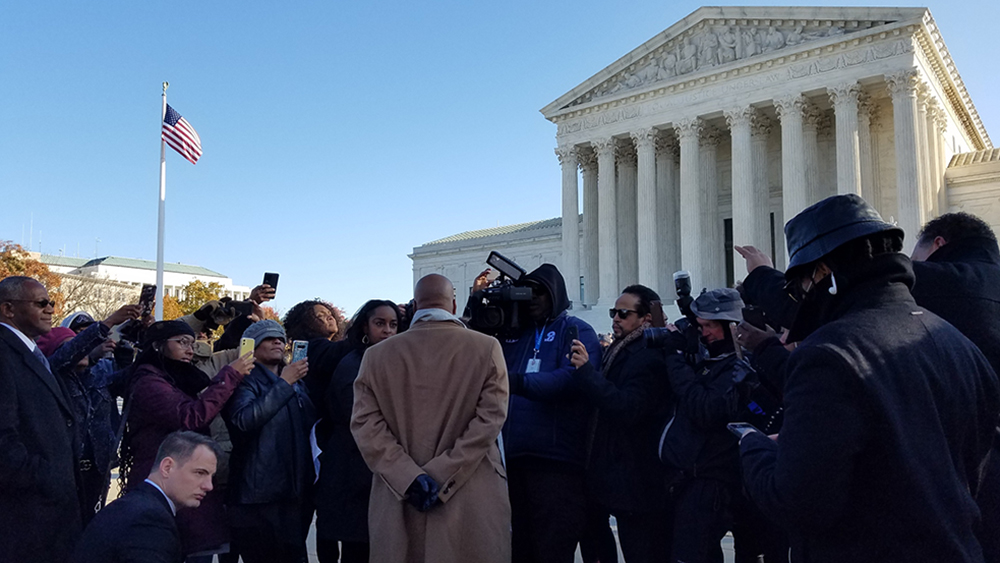
20 Nov Emotions Run High as Supreme Court Hears Byron Allen v. Comcast Arguments
By Cynthia Littleton
WASHINGTON, D.C. — Sharon Fletcher traveled from Bethlehem, Pa., in the hopes of attending Wednesday’s Supreme Court hearing in the civil rights lawsuit filed by entrepreneur Byron Allen against cable giant Comcast.
Fletcher was one of several hundred people who waited in line for a seat in the courtroom. She was there before 8 a.m. on a chilly morning with her sister and her cousin, waiting on the marble steps of the nation’s highest court. Fletcher said she is part of what she describes as a burgeoning “political platform” called American Descendants of Slavery (ADOS). It was important for her to be at the courthouse in person, even if she had doubts about whether she’d actually land a seat.
“After 400 years, we are still fighting for a place at the table,” Fletcher said. She sees Allen, the founder and CEO of Entertainment Studios, as a hero for African Americans for pursuing his discrimination case with vigor.
Allen has accused Comcast of racial discrimination because of its refusal to carry seven lifestyle cable channels that he operates through Entertainment Studios. Comcast has steadfastly maintained that its decision-making had nothing to do with race, but rather its assessment that there was little audience demand for the channels, which include Comedy.tv, Pets.tv, Justice Central and Recipe.tv.
“Byron Allen came out of left field,” Fletcher said. “They did not think there would be someone to challenge them. That’s why I’m here, and that’s why I’m loving this.”
Brenda Smith, of Austin, Texas, and also affiliated with ADOS, said she has worked in the corporate world and dealt with many contract negotiations. “I understand what Byron is going through,” Smith said. “We’re just trying to make sure, for my children and my children’s children, that we don’t want it to be like this in another 400 years.”
Smith emphasized that the high court’s decision on the legalities of the Entertainment Studios suit will have repercussions for other cases. “It’s about our rights,” Smith said. “We’re here for that. It’s not just about Byron.”
Tosha Terry, a children’s programming producer from Washington, D.C., echoed that sentiment. “It’s not an equality opportunity for us to have the chance,” Terry said. “Almost 100% of children’s programming is not produced by African Americans. That’s why there’s a lack of diversity (in children’s programming).”
The Allen-Comcast hearing also drew a handful of demonstrators urging Comcast to keep the pay TV channels group Starz on its cable systems. Comcast and Starz, which is owned by Lionsgate, have been tussling over carriage renewal terms. Starz has told its subscribers that it could go dark on Comcast systems if a deal isn’t reached by Dec. 10.
Protestors at the Supreme Court focused attention on Starz as the home of “Power,” the crime drama that ranks high among the most-watched series in African-American homes. The group circulated a petition and carried professionally printed signs declaring: “Stop Comcast. Keep Starz. Sign the Petition.”
Given the David vs. Goliath dynamic, Comcast has struggled to make its case in the court of public opinion. That much was very clear from the turnout for the hearing. While detractors say Comcast is trying to make it harder for individuals and firms to pursue racial discrimination cases in business, Comcast emphasized that Wednesday’s hearing focused on a narrow question of legal interpretation that it believes is germane to the case.
“As today’s Supreme Court hearing demonstrated, this case centers on a narrow, technical point of law that will not in any way lessen the nation’s civil rights laws,” Comcast said in a statement.
“Comcast believes that the civil rights laws are an essential tool for protecting the rights of African-Americans and other diverse communities — and this case will not change those protections. Our advocacy was limited to urging that section 1981 in our case be interpreted the same way it has been interpreted for decades across the country. We are optimistic the Court will reverse the incorrect 9th Circuit decision and, in light of the trial court’s dismissal three separate times of these discrimination claims, bring this case to an end. Comcast has a strong civil rights and diversity record and an outstanding history of supporting and fostering diverse programming from African-American owned channels,” the company said.
After the hearing, Allen told Variety he was pleased with how it unfolded for his legal team, led by Erwin Chemerinsky, dean of the UC Berkeley School of Law. Allen said the pointed questions from the justices indicated they recognized the significance of the legal question about the standard that Allen would have to prove to prevail in the suit, first filed in early 2015.
“This case is bigger than me,” Allen said. “The civil rights of 100 million Americans are at stake in the question of what legal standard to use. This is a very important decision.”


